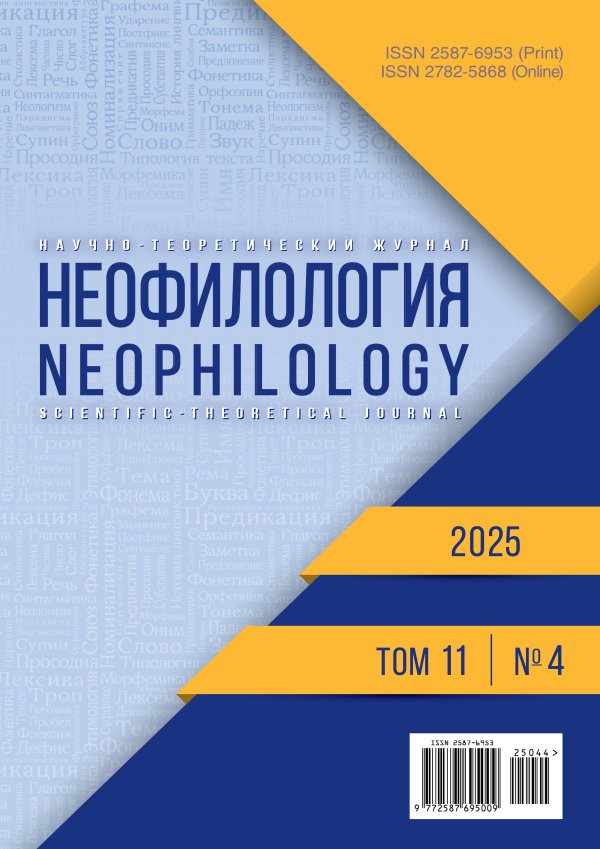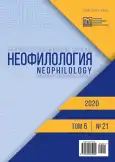Гендерные стереотипы маскулинности в диалектной коммуникации (на материале бранных номинаций мужчин)
- Авторы: Маркина Л.В.1
-
Учреждения:
- ГАОУ ВО г. Москвы «Московский городской педагогический университет»
- Выпуск: Том 6, № 21 (2020)
- Страницы: 5-14
- Раздел: РУССКИЙ ЯЗЫК
- URL: https://journal-vniispk.ru/2587-6953/article/view/302779
- EDN: https://elibrary.ru/rufwbq
- ID: 302779
Цитировать
Аннотация
Целью исследования является описание некоторых традиционных гендерных стереотипов маскулинности, бытующих в современной диалектной коммуникации, с опорой на анализ бранных именований мужчин. Актуальность темы обусловлена значимостью проблемы гендерных стереотипов для выявления, а также для имеющих место обоснования и упрочения существующей в современном отечественном социуме гендерной асимметрии. Методологическая основа исследования – реализованное в работах А.В. Кирилиной понимание гендера как социокультурного конструкта, предполагающего описание существующих в социуме стереотипных гендерных представлений о признаках, качествах, моделях поведения, обусловленных принадлежностью к определённому полу и отражённых в различных единицах языка. Проанализированы бранные номинации мужчин в русских говорах и отмечено их использование, прежде всего, для обозначения носителей тех качеств, которые не соотносятся в народном сознании с традиционным «идеальным» образом мужчины как репрезентанта доминирующего пола с предопределенным природным мироустройством, правом на господствующие позиции в обществе. Негативной оценке подвергаются: отсутствие физической силы и выносливости, хозяйственных навыков; тунеядство; пребывание в праздности; бесхарактерность, слабоволие, покладистость в семейной жизни; излишняя скромность (мухрышка, гатила, чужеспинник, хабольник, продыра и др.). Подтверждено также неприятие у лиц мужского пола качеств, не отвечающих нормам жизненных устоев деревенского социума, устоявшимся национальным нравственным ценностям, – спесь, хвастливость, нелюдимость, а также наглость, пронырливость, хитрость, жуликоватость, бесцеремонность (чванишка, хвальбун, молчага, ухач, шныра, хап и др.). Выявлены мужские качества, негативно оцениваемые с помощью бранных номинаций лишь в своём чрезмерном проявлении или избирательно, – склонность к употреблению алкоголя, агрессивность, свобода поведения (пьянушка, бузуй, чужебабник и др.). Обоснована немногочисленность относящихся к мужчинам бранных номинаций с семантикой, традиционно соотносимой в диалектной среде с принадлежностью исключительно или преимущественно женщинам и тем самым воспринимаемой как снижающая статус мужчины, – ворчливость, жадность, болтливость, привередливость, назойливость, суетливость, трусливость, скандальность, бестолковость (хныч, жадоба, балабан, чемезинник, мула, толкун, хлыстень, тюляпай, тупяк и др.). Сделан вывод, что диалектные бранные номинации мужчин, опосредованно отражающие специфику русского национально-культурного сознания, поддерживают патриархальные гендерные стереотипы, представляя собой свидетельство андроцентричности диалектной картины мира.
Ключевые слова
Об авторах
Л. В. Маркина
ГАОУ ВО г. Москвы «Московский городской педагогический университет»
Автор, ответственный за переписку.
Email: markina.lv@mail.ru
ORCID iD: 0000-0003-0391-0029
доктор филологических наук, доцент, профессор кафедры русского языка и методики преподавания филологических дисциплин
129226, Российская Федерация, г. Москва, 2-й Сельскохозяйственный пр., 4, корп. 1Список литературы
- Вендина Т.И. Диалектное слово: вчера, сегодня, завтра // Вестник Костромского государственного университета. 2017. Т. 23. С. 44-49.
- Демешкина Т.А., Толстова М.А. Гендерная диалектология и словари как её источник // Вопросы лексикографии. 2017. № 12. С. 83-105.
- Новосёлова О.А. Невестка и свекровь в диалектной картине мира // Вестник Новосибирского государственного университета. Серия: история, филология. 2012. Т. 11. № 9. С. 197-201.
- Толстова М.А. Отражение гендерной картины мира в наименованиях лиц женского пола в диалекте // Научное наследие В.А. Богородицкого и современный вектор исследований Казанской лингвистической школы: тр. и материалы Междунар. конф. Казань, 2016. С. 292-298.
- Толстова М.А. Гендер в традиционной культуре сквозь призму словаря // Вестник Томского государственного университета. Культурология и искусствоведение. 2016. № 4 (24). С. 68-75.
- Маркина Л.В. Гендерные стереотипы в диалектной коммуникации (на материале бранных номинаций женщин) // Русистика и компаративистика: сб. науч. тр. по филологии / гл. ред. С.А. Васильев. М.: Книгодел, 2019. Вып. 13. С. 234-243.
- Демешкина Т.А., Тубалова И.В. Диалектный дискурс как сфера реализации национальной культуры: константы и трансформации // Вестник Томского государственного университета. Филология. 2017. № 50. С. 36-54.
- Словарь гендерных терминов / под ред. А.А. Денисовой. М.: Информация XXI век, 2002. 256 с.
- Маркина Л.В. Диалектные бранные обозначения женщин (на материале современных русских говоров) // Русский язык и литература в образовательном процессе: сб. материалов Междунар. науч.-практ. конф. Саратов: ИД «МарК», 2016. С. 64-69.
- Стернин И.А. и др. Выявление признаков унижения чести, достоинства, умаления деловой репутации и оскорбления в лингвистической экспертизе текста. Ярославль, 2013. 35 с.
- Словарь русских говоров на территории Республики Мордовия / сост. Э.С. Большакова и др. Саранск, 1978–2006. Т. 1-8.
- Семенкова Р.В. Фразеологический словарь русских говоров Республики Мордовия. Саранск: Изд-во Мордов. ун-та, 2007. 330 с.
Дополнительные файлы










